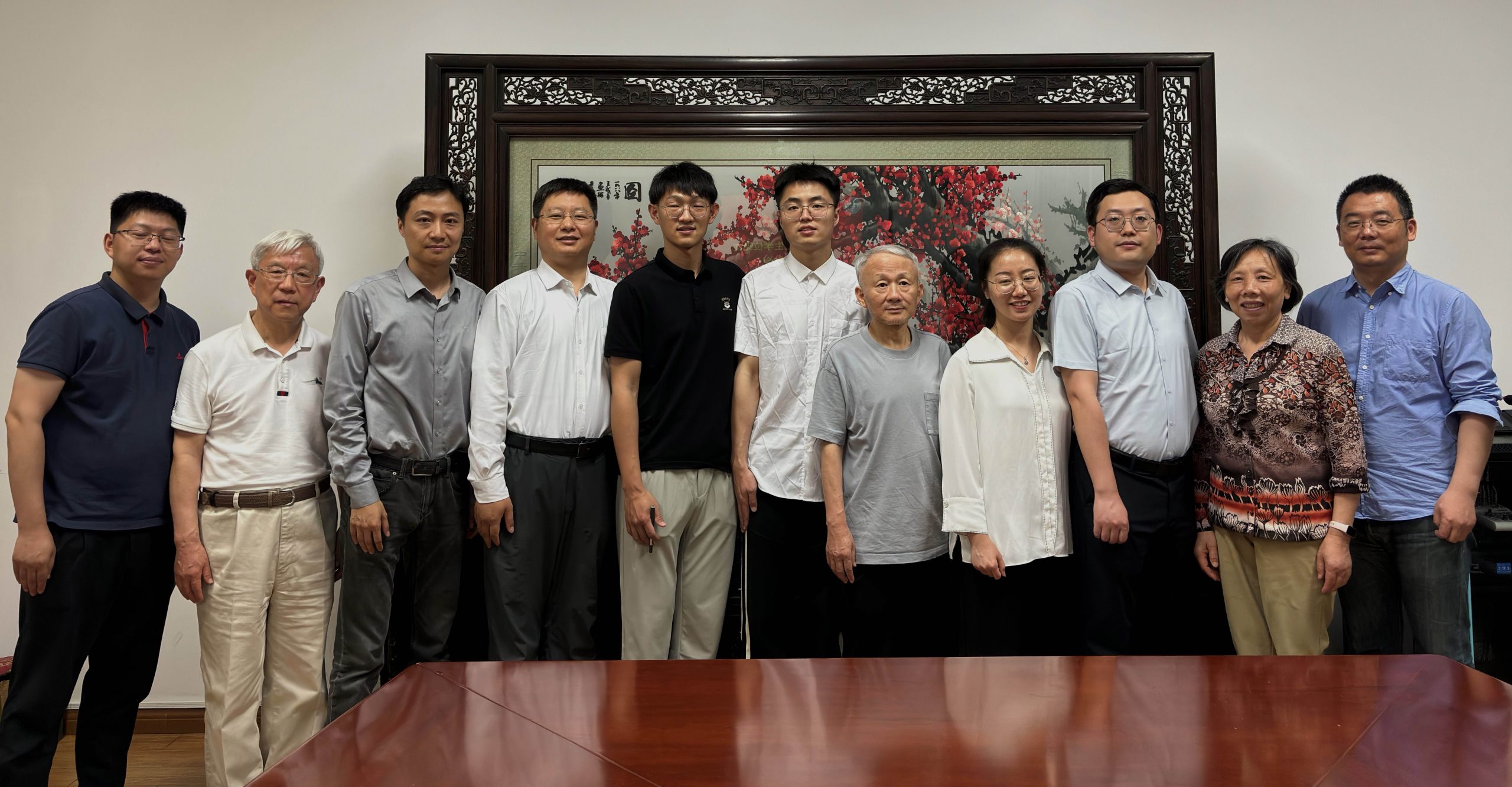硕博研究生答辩Mr. Pei-dong Wu, Miss Wen-juan Guo, Mr. Gong-xun Xu and Mr. Ge-liang Xie successfully defended their Doctoral and Master theses
24 5 月, 2024
吴培栋等通过博士和硕士论文答辩Mr. Pei-dong Wu et al. passed their thesis defence
Mr. Pei-dong Wu, Miss Wen-juan Guo, Mr. Gong-xun Xu and Mr. Ge-liang Xie successfully defended their Doctoral and Master theses
In the afternoon, May 20, 2024, graduate thesis defence for PhD student Mr. Pei-dong Wu and Master students Miss Wen-juan Guo, Mr. Gong-xun Xu (supervised by Prof. Zhen Fang), and Mr. Ge-liang Xie (supervised by Dr. Lujiang Xu) of Biomass Group at Nanjing Agricultural University (NJAU), was held at C302 Yuxian Building, Pukou Campus, NJAU. Prof. En-lai Zheng from NJAU chaired the defence committee, and other five experts (Prof. Deng-yu Chen from Nanjing Forestry University, Prof. Shuang Wang from Jiangsu University, Profs. Kun-quan Li, Wei-min Ding and Chun-xia He from NJAU) were invited as the members of the committee.
The four students presented their theses before the Panel after past external review and courses and replied questions raised by all the members.
Mr. Wu presented his PhD dissertation work entitled “Study on construction of visible light-responsive photoanodes enabling photoelectrochemical synthesis of lignin-based oxygen-rich compounds”.
Miss Guo presented her master thesis work entitled “Study on Characteristics of Phenolic Substances Produced by Biomass Catalytic Pyrolysis Based on Experiment and Machine Learning” .
Mr. Xu presented his master thesis work entitled “Red Mud Loaded Ni-Cu Bimetallic Materials for Hydrothermal Hydrogen Production from Biomass”
Mr. Xie presented his master thesis work entitled “High-Value Utilisation of Waste Aromatic Resources Based on Directed Thermal Conversion of Oxygenated Functional Groups”.
Nine first-authored papers were published in prestigious Journals. Three, one, two and three papers were published by Mr. Wu, Miss Guo, Mr. Xu and Mr. Xie, respectively. All the four students were awarded the title of 2024 Outstanding Graduates of NJAU.
After secret ballot, the panel agreed to confer Doctor of Philosophy in Engineering to Mr. Pei-dong Wu, and MSc in Engineering degree to Mr. Gong-xun Xu and Mr. Ge-liang Xie, Master of Electronics and Information Technology to Miss Wen-juan Guo, subjected to the approval by the Academic Degrees Committees of the college and university.
All students found decent jobs, Mr. Wu got a faculty position in Tanshan, Hebei.
Congratulations to Mr. Wu, Miss Guo, Mr. Xu and Mr. Xie!
硕博论文答辩
2024年5月20日下午,南京农业大学生物能源组2020级博士研究生吴培栋和硕士研究生郭文娟(女)、徐功迅(导师方真教授)、谢葛亮(导师徐禄江副教授)毕业答辩会在南京农业大学浦口校区育贤楼C302举行。南京农业大学的郑恩来教授担任答辩评审委员会主席,南京林业大学的陈登宇教授,江苏大学的王爽教授,南京农业大学的李坤权教授、丁为民教授和何春霞教授共六位专家担任答辩评审委员。
答辩会上,吴培栋、郭文娟、徐功迅和谢葛亮四位同学依次对其在校期间的学术论文进行汇报,同时答辩委员会主席和各位评委提出了相关问题。根据四位同学的问题回答以及学位论文的外审意见,评委会经过评审决议,一致认为吴培栋、郭文娟、徐功迅和谢葛亮四位同学顺利完成了毕业所需要的研究和学习要求。
吴培栋同学在毕业论文《可见光响应光阳极的构筑及其光电催化合成木质素基富氧化合物的研究》中以BiVO4、α-Fe2O3和TiO2光电极为出发点,通过掺杂和引入过渡金属基(Mn、Fe、Co和Ni)助催化剂等策略去改善上述问题,构筑了具有潜在应用前景的复合光电极。同时选取木质素衍生醇、酮、β-O-4二聚体和β-1二聚体作为底物,研究光电极界面活性位点与底物的作用机制,阐明C-O成键、C-C断键的机理以促进上述底物高效、专一化升级为芳香族羧酸。郭文娟同学在毕业论文《基于实验与机器学习的生物质催化热解制备酚类物质特性研究》中对生物质催化热解定向制备酚类物质的工艺方法和产率影响因素进行了研究,分析了氮掺杂生物炭催化剂热解过程中产酚的作用机理,并构建了基于生物质原料特性、热解条件和催化剂孔隙特性的苯酚产率预测模型。徐功迅同学在毕业论文《赤泥负载Ni-Cu双金属材料用于生物质水热制氢》通过改性与探究寻找到了一种成本低廉且高效的赤泥基催化剂。对比了不同金属负载量和金属促进剂对赤泥基催化剂性能的影响,确定了30Ni-2.5Cu/RM为最优催化剂。运用了BET、XRD、TPR、XRF等多种技术手段进行深入分析,揭示催化剂的可能催化机理。同时,还对实验温度、时间、催化剂用量及棉秆用量这四个关键参数进行了系统优化,以确定最佳的实验条件。在找到最优条件后,进一步将其应用于多种农业废弃物及模型化合物的气化实验中。谢葛亮同学在毕业论文《基于含氧官能团定向热转化的废弃芳香资源高值利用研究》中研究了芳香族含氧聚合物的下游高值化利用,通过木质素与POM的催化共热解成功合成了富含芳香族烃的生物油,此外通过一锅法氨化与气相加氢脱氧(HDO)两步实现了木质素基香草醛到羟基苯甲腈的绿色制备,还通过PET与尿素的共热解制备了对苯二甲腈。
吴培栋同学以第一作者身份共发表学术论文3篇,郭文娟同学以第一作者身份共发表学术论文1篇,徐功迅同学以第一作者身份共发表学术论文2篇,谢葛亮同学以第一作者身份共发表学术论文3篇,四位同学均获得了2024年南京农业大学优秀毕业生称号。
经评委会无记名投票表决,一致同意吴培栋同学通过博士学位论文答辩,建议授予工学博士学位;郭文娟同学通过硕士学位论文答辩,建议授予郭文娟电子信息专业硕士学位;徐功迅同学通过硕士学位论文答辩,建议授予徐功迅工学硕士学位;谢葛亮同学通过硕士学位论文答辩,建议授予谢葛亮工学硕士学位。
吴培栋同学获唐山一高校教职;
郭文娟(女)和徐功迅入职南京某高校;
谢葛亮继续南农读博;
祝贺四位同学!
Publications发表的论文:
[1] PD Wu, H Li*, Zhen Fang*, Synergistic catalysis of Co-Zr/CNx bimetallic nanoparticles enables reductive amination of bio-based levulinic acid. Advanced Sustainable Systems, 2022, 6, 2100321. https://doi.org/10.1002/adsu.202100321
[2] PD Wu, LY Li, KP Wang, H Li*, Zhen Fang*. Non-quantum nanostructures-enabled hot carriers generation for enhancive photoelectrocatalytic oxidation of bio-alcohol in water coupled with hydrogen evolution, Green Chemistry, 2023, 25, 2771-2781. https://doi.org/10.1039/D3GC00226H
[3] PD Wu, LY Li, H Li*, Zhen Fang*. Interfacial high-valence Ni(IV)-enabled C-H activation for photoelectrochemical C-C bond cleavage of lignin to exclusively produce aromatic carboxylic acids. Chemical Engineering Journal, 2024, 490, 151722. https://doi.org/10.1016/j.cej.2024.151722
[4]WJ Guo, YR Wang, W Chen*, GX Xu, GQ Zhu, GL Xie, LJ Xu, Zhen Fang, QF Zhang, HP Yang. Insight into the synergistic influence of nitrogen-doped biochar and NH3 on selective production of 4-vinyl phenol from biomass catalytic pyrolysis by coupling catalyst in-situ regeneration. Industrial Crops and Products, 2024, 214, 118520. https://doi.org/10.1016/j.indcrop.2024.118520
[5]GX Xu, S Nanda, JJ Guo, YQ Song, JA Kozinski, AK Dalai, Zhen Fang*, Red mud supported Ni-Cu bimetallic material for hydrothermal production of hydrogen from biomass. Industrial Crops and Products, 2024, 212, 118370. https://doi.org/10.1016/j.indcrop.2024.118370
[6]徐功迅,陈伟,方真*.生物质超临界水制氢研究进展[J].农业工程学报, 2023, 39(7): 24-35. 10.11975/j.issn.1002-6819.202301053.
[7]谢葛亮, 周贤君, 董澄宇, 陈伟, 徐禄江*, 方真. 木质素基芳香醛类化合物的制备及其转化研究进展[J]. 林产化学与工业, 2023, 43(04):115-126. 10.3969/j.issn.0253-2417.2023.04.016
[8]GL Xie, GQ Zhu, T Lv, YF Kang, YH Chen, Z Fang, LJ Xu*. Sustainable production of aromatic-rich biofuel via catalytic co-pyrolysis of lignin and waste polyoxymethylene over commercial Al2O3 catalyst, Journal of Analytical and Applied Pyrolysis, 2023, 174, 106147. https://doi.org/10.1016/j.jaap.2023.106147.
[9]GL Xie, GQ Zhu, YF Kang, MX Zhu, QQ Lu, C He, LJ Xu*, Z Fang. Valorization of Waste PET: Understanding the Role of Active Ammonia in Facilitating PET Depolymerization and Aromatic Nitrile Formation. Journal of Cleaner Production, 2024, 434, 140204. https://doi.org/10.1016/j.jclepro.2023.140204.